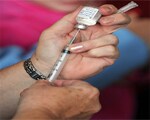Using a standard 1-inch needle to immunise obese adolescents against hepatitis B virus produces a much weaker effect than using a longer needle.

Researchers vaccinated 22 young women and two young men in the shoulder over three years, randomly assigning them to be injected with either a 1-inch or a 1.5-inch needle. Once injected, vaccines trigger production of small molecules called antibodies, which kick-start our immune system if we are ever attacked by the virus again. It was found that the two groups turned out to have different antibody counts depending on the needle used. In those injected with the short one, the number was almost halved. Although everyone in the study had enough antibodies to be considered protected against hepatitis B, a lower count generally means a less robust response.
For years, doctors have known that vaccines tend not to work as well in heavy people. Whether the obese have weaker immune systems, or fat keeps shorter needles from reaching muscles, where the vaccines can affect immune cells, was unclear. The introduction of the hepatitis B vaccine in the 1980s offered some clues. Soon after doctors began using the vaccine, they realised that it was failing to protect some female nurses. At the time, the shot was given in the buttock and was thwarted by the padding there. Instead of entering the muscle as it was supposed to, the vaccine apparently was broken down in the fat tissue, where it had little chance to affect immune cells. So doctors began giving the shot in the less-padded shoulder. With the obesity epidemic now adding extra insulation to the shoulder, the needles are going to have to be longer.
The Centers for Disease Control and Prevention recommends longer needles in obese patients, but it is unclear how many doctors follow these guidelines, or even know about them. Women are more affected by needle length than men, because their fat distribution is different. But even obese women shouldn't be overly concerned until more research has been done.
DoctorNDTV is the one stop site for all your health needs providing the most credible health information, health news and tips with expert advice on healthy living, diet plans, informative videos etc. You can get the most relevant and accurate info you need about health problems like diabetes, cancer, pregnancy, HIV and AIDS, weight loss and many other lifestyle diseases. We have a panel of over 350 experts who help us develop content by giving their valuable inputs and bringing to us the latest in the world of healthcare.












